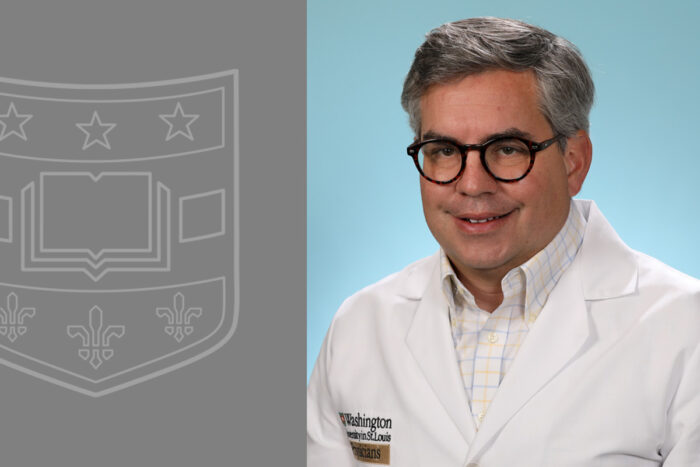Duncavage named director of new division in pathology & immunology
Recognized for contributions to Medicare-approved whole-genome tests
 WASHINGTON UNIVERSITY SCHOOL OF MEDICINE
WASHINGTON UNIVERSITY SCHOOL OF MEDICINEEric Duncavage, MD, a professor of pathology & immunology, has been named director of the newly created Division of Genomic and Molecular Pathology in the Department of Pathology & Immunology at Washington University School of Medicine in St. Louis.
Eric Duncavage, MD, a professor of pathology & immunology, has been named director of the newly created Division of Genomic and Molecular Pathology in the Department of Pathology & Immunology at Washington University School of Medicine in St. Louis.
Duncavage is a hematopathologist and molecular pathologist who evaluates and identifies abnormalities in patients’ blood, bone marrow and lymph node cells to diagnose leukemias and lymphomas. Since joining the university in 2011, he has worked with a team to develop whole-genome sequencing tests for blood cancers and solid tumors, making them accessible to a broader community through Medicare reimbursement approval. Molly Schroeder, PhD, an associate professor of pathology & immunology, will serve as the new division’s associate director.
“We are pleased that Drs. Duncavage and Schroeder will lead our new division, as they have been vital in the growth of our molecular and genomic efforts to date,” said Richard J. Cote, MD, the Edward Mallinckrodt Professor and head of the Department of Pathology & Immunology. “The work they have done to develop genetic tests that detect specific therapeutic targets in cancer is a crucial step in the application of precision medicine for individual patients, and is a significant contribution to the long and celebrated history in molecular and genomic discovery and analysis at the School of Medicine.”
Duncavage will lead the new division, which will aim to unify and organize efforts and resources across the School of Medicine, aiding the development of new tests to impact a wide range of diseases and prioritizing their distribution to a broad patient population.
“We offer some of the best genetic tests making a difference in patient care,” Duncavage said. “We are thrilled that our local community benefits from them and want to make sure that other patients also have access. The goal of this division is to continue to develop these innovative tests and then deploy them across our system and nationally so that everyone can benefit from them.”
School of Medicine scientists at the university’s McDonnell Genome Institute have played a vital role in genome sequencing throughout the history of the field. The development of Chromoseq, the first whole-genome cancer test approved for reimbursement by the Centers for Medicare and Medicaid Services (CMS), and GatewaySeq, a small-panel test that identifies relevant therapeutic targets in solid tumors and was also recently approved for reimbursement by CMS, furthers the university’s leadership in advancing medical technology that can guide targeted treatments for cancer patients.
“Siteman Cancer Center performed the first whole-genome sequencing of a cancer patient in 2009,” said Timothy J. Eberlein, MD, director of Siteman Cancer Center, based at Barnes-Jewish Hospital and Washington University School of Medicine in St. Louis. “Under Dr. Duncavage’s leadership, we have made whole-genome sequencing more practical, affordable and faster, making our goal of providing the most accurate, personalized care to our cancer patients a reality.”
Under one division, Duncavage plans to expand the university’s pathology services by bringing together scientific and clinical expertise. By unifying the administrative functions of offered services, the university aims to integrate these services across health-care centers and reach a greater patient population. A unified division focused on genomic and molecular testing also will enhance the department’s training program by providing a more streamlined educational experience, explained Cote.
Duncavage earned his bachelor’s degree from Vanderbilt University in Nashville and his medical degree from the University of Tennessee College of Medicine in Memphis. He completed his residency in anatomic and clinical pathology at Washington University and Barnes-Jewish Hospital.






